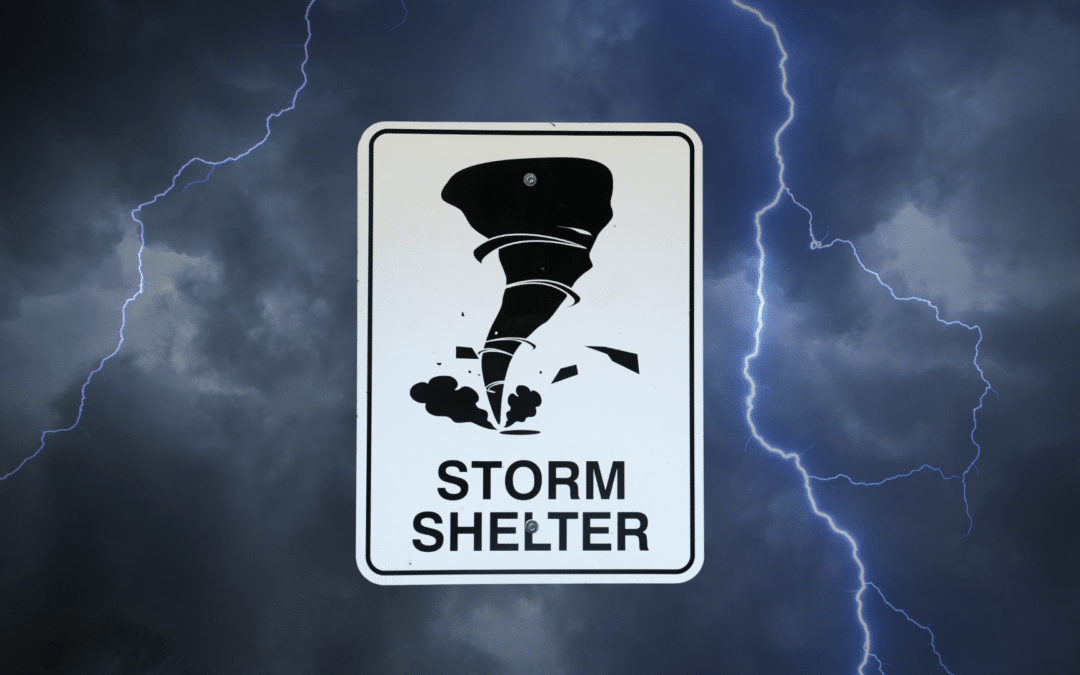Spring storms – including lightning, hail, flooding, high winds, and even tornadoes – can catch you or family members away from home. Finding safe public shelter during severe weather can be hard enough, but coronavirus has made that (like everything else!) even more difficult.
Follow these tips to stay as safe as possible from the storm and the virus.
First things first: Sheltering during a pandemic
Your number one priority during a severe storm is finding a safe place to shelter; the second priority is protecting against Covid-19. In other words, don’t let a fear of the virus preclude you or family members from seeking life-saving shelter. That said, shelters that are open will most likely post notices that those who seek shelter to do so at their own risk. If they’re able, they may provide hand sanitizer, hand-washing stations, and perhaps even face masks. They’ll also be strict about occupancy limits.
Know where to go
Depending on the size and population of your area, there may or may not be designated public storm shelters in your community. Check with your local emergency manager or fire department, the American Red Cross, FEMA, or other emergency weather preparedness body well ahead of the storms for shelter locations. From there, check to see which shelters are open and operating during the pandemic – you may find that some have decided to close until the virus is under control.
Where to go
When a storm does hit, even designated shelters that are open during the pandemic may close their doors due to overcapacity (public shelters aren’t designed for thousands of people). If you end up needing to find shelter on the fly, remember these tips.
-
- If seeking shelter in public buildings, seek out substantial ones. Reinforced concrete buildings are usually stormproof.
- Small rooms, such as restrooms, storerooms, windowless closets, or other small sturdy rooms, are better than large ones.
- Auditoriums and gymnasiums are not generally safe.
- Avoid high walls that could collapse.
- Get underground or under a table. Cover your head.
- If basements are not available, go to a first-floor room.
- Stay away from windows, glass, and large rooms.
- Do not shelter in a mobile home or vehicle.
Protecting against COVID
If you are able to get into a shelter (or end up sheltering with others at a non-designated location), follow the same COVID precautions that are habit by now: social distancing as much as possible, always wear a mask, and use hand sanitizer and/or wash hands frequently. Cover your sneezes and coughs and avoid touching high-touch surfaces. Try not to share food or drink with anyone, if possible. If you made it into a shelter, they will have policies and rules for protecting public health as much as possible – follow all instructions from the shelter staff.
Plan ahead
With all these various factors to deal with, you can give yourself and your family an edge by preparing in advance. Your two best weapons will be: Having a personal/family plan and staying informed. So, before the storms come:
- Make a plan. Ensure that you and your family have a plan for severe weather events. For example, if your kids are at baseball practice or you’re at work or running errands, make sure everyone knows where to go if severe weather hits. Know the local shelters that are open during the pandemic, add them to your family’s emergency plan, and make sure all family members know and can act upon the plan.
- Tune in and stay aware. All family members need to stay informed by trusted sources. Set up redundant sources of information so that you don’t miss any alerts. These might include:
-
- Phone apps and emergency/weather websites
- Programmable all-hazard radios
- Local news stations and media
-
- Carry supplies in your car at all times. This is a great time to double-check your vehicle’s emergency kit (and for that matter, your grab-and-go emergency kit). Replace batteries, food, water, or any other items that may be expired. If you haven’t already, add coronavirus supplies as well – masks, hand sanitizer, and soap.
It can’t get much worse than a severe storm during a pandemic, but knowing what to do and how to protect yourself and your family can give you an added layer of security and confidence.
This article is furnished by California Casualty, providing auto and home insurance to educators, law enforcement officers, firefighters, and nurses. Get a quote at 1.866.704.8614 or www.calcas.com.
- Graduation – When to Remove Your Child from Your Auto Policy - May 18, 2023
- How to Prevent Catalytic Converter Theft - May 17, 2023
- How Much Does Home Insurance Cost? - May 17, 2023

